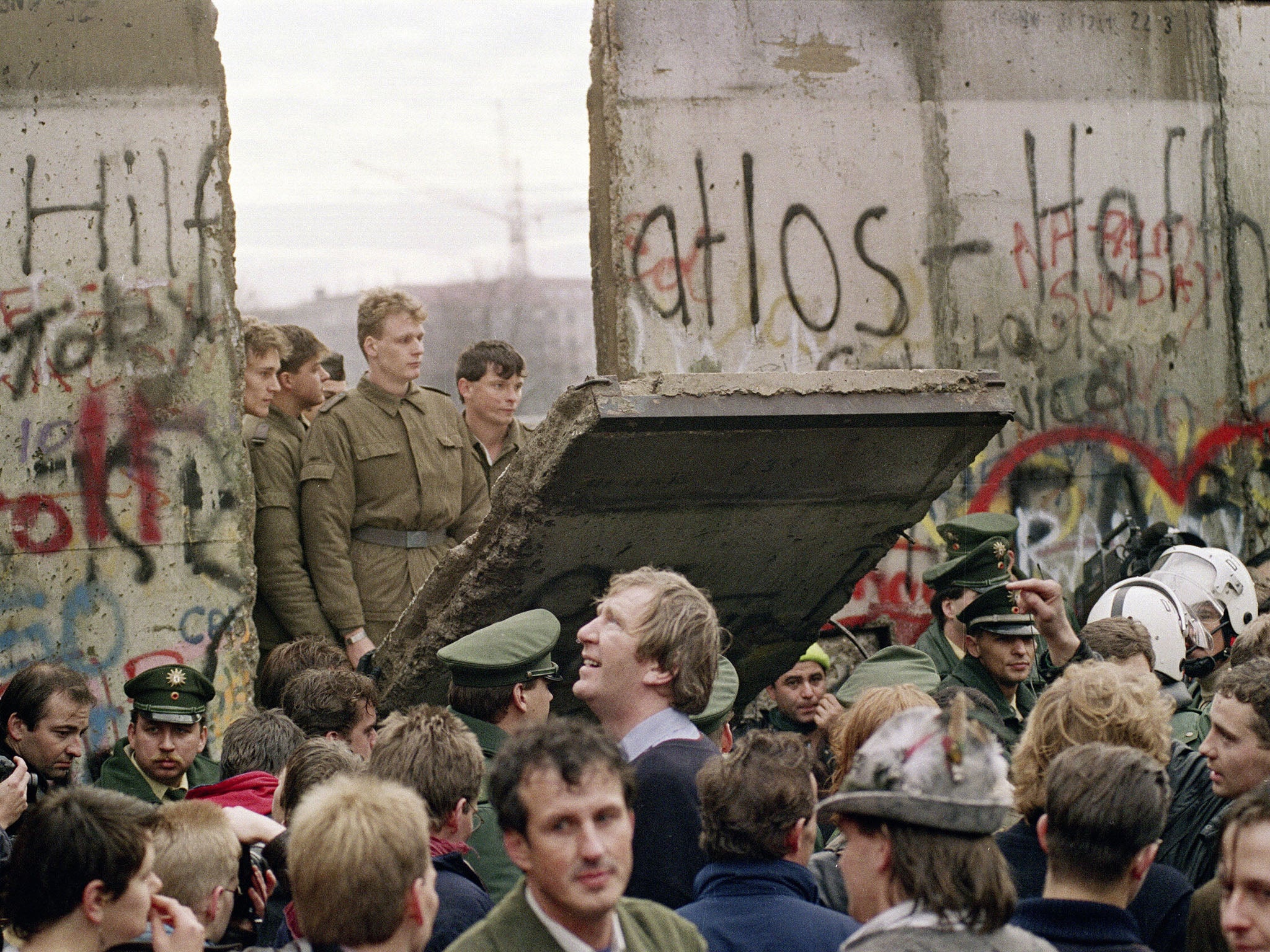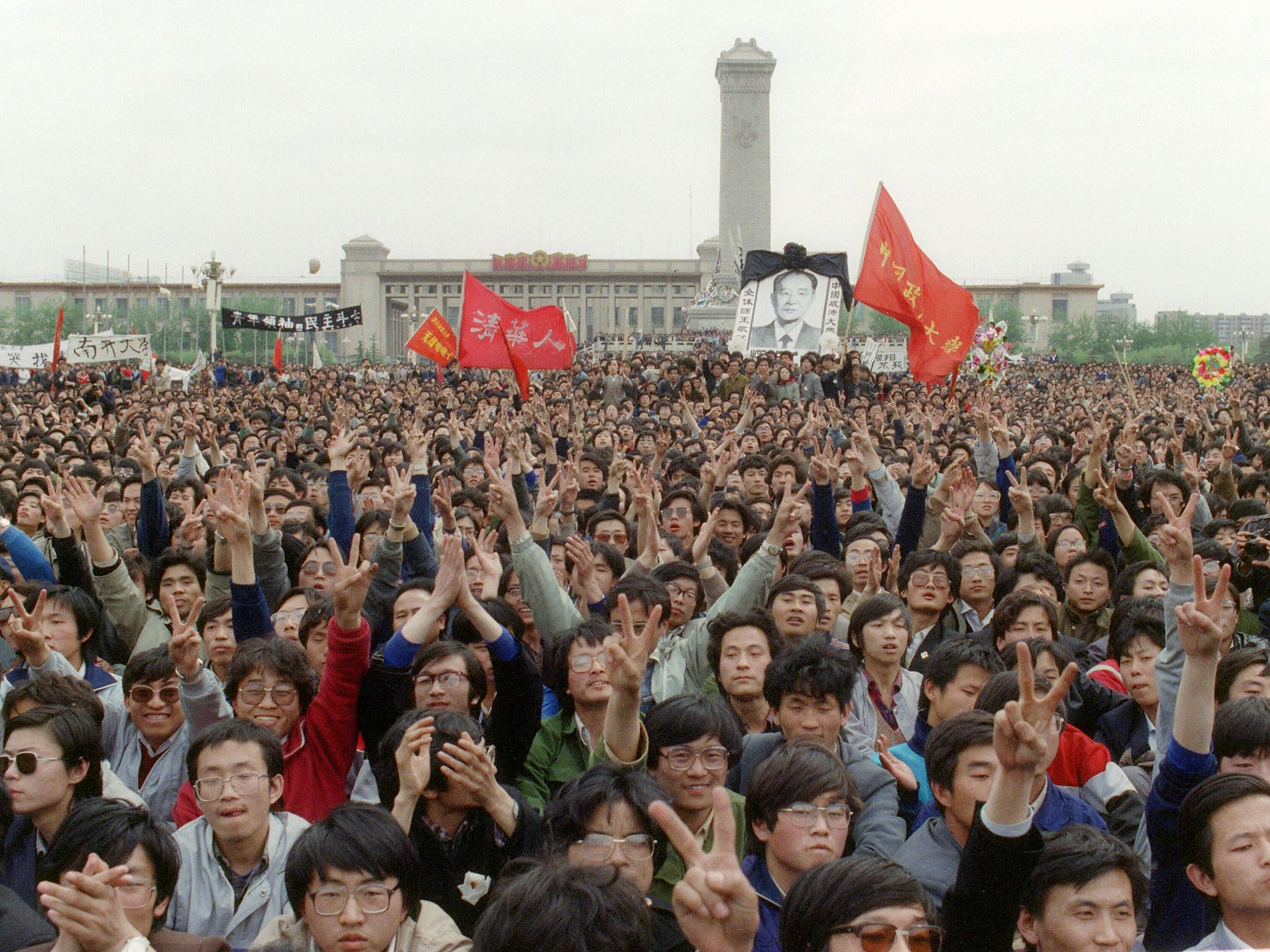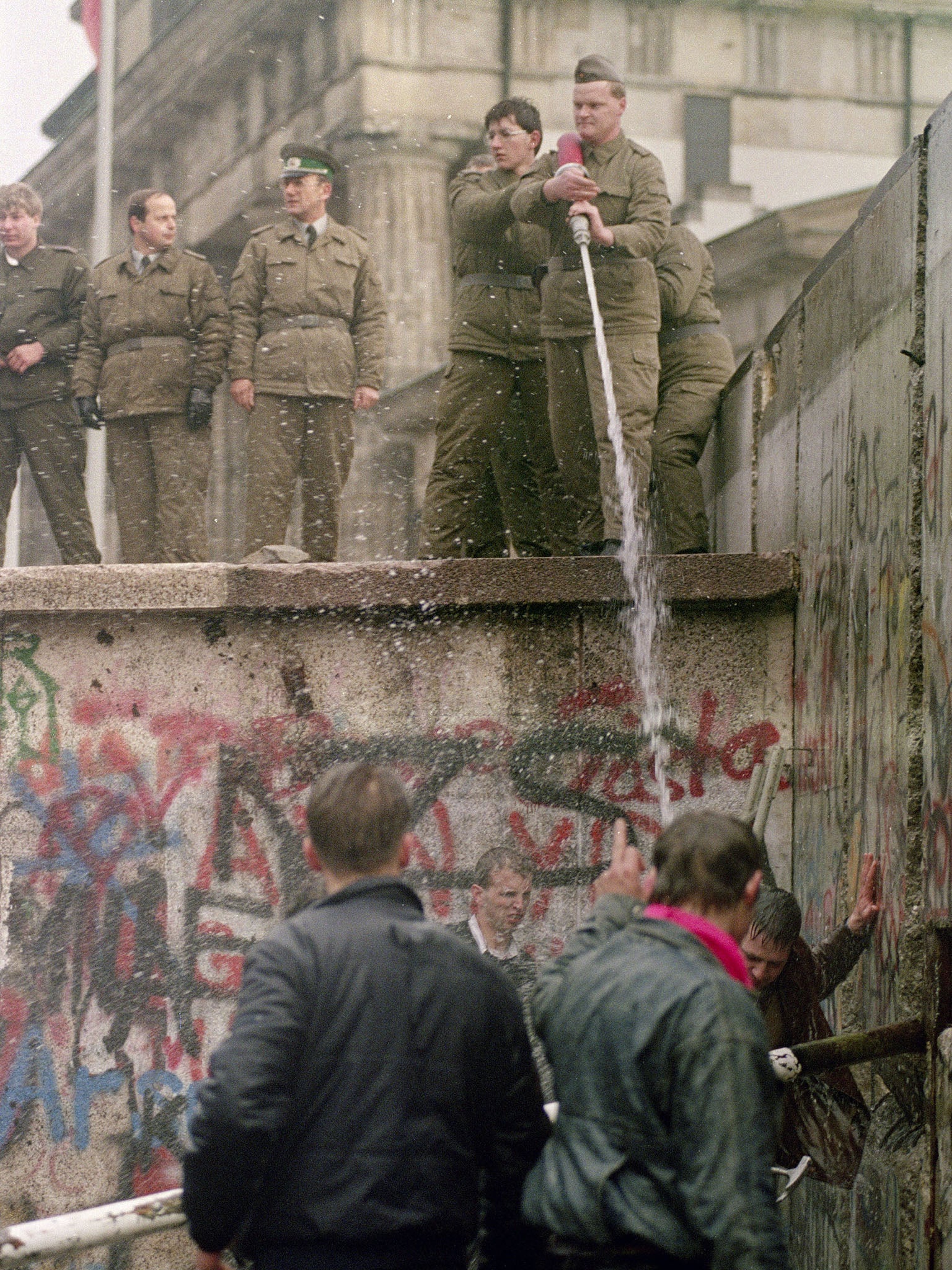From the Velvet Revolution to the fall of the Berlin Wall: How 1989 became the year communism collapsed
In Poland it took 10 years; in East Germany 10 weeks; in Czechoslovakia 10 days. It was 1989 and across eastern Europe communism was coming to an end. Thirty years on, Mick O’Hare looks at how we are still experiencing the fallout of that tumultuous year


It’s funny,” says Sandor Csapo. “But I guess we had no idea what the world would be like 30 years later. All we knew was what we didn’t want anymore.” It’s too late to canvass opinion on what Csapo, then a student from Eger, and his fellow protestors expected as they stood in the rain outside Hungary’s state television studios in Budapest in the spring of 1989.
They were part of a growing opposition to communist single-party rule in Hungary and other satellite states of the Soviet Union. And while they probably didn’t imagine they’d now be living under the staunchly nationalist, anti-immigrant government of Viktor Orban and his Fidesz conservatives, they did know they wanted change. And they got it.
Even compared with today’s political volatility, 1989 was – to employ a word overused in politics – tumultuous. Attention initially focused on the Lenin shipyard in Gdansk and the confrontations between the trade union Solidarity led by Lech Wałęsa and the Polish government of Wojciech Jaruzelski, so it was easy to overlook Hungary. But as people asserted opposition to the communist parties that had ruled their lives pretty much since the end of the Second World War – often via oppressive means and tightly controlled media – it could be argued that events in Budapest begat one of two pivotal moments in the collapse of Soviet hegemony.
In May, after weeks of protest and the rise of political parties of many hues opposed to communist rule, the Hungarian government of Miklos Nemeth opened its border with Austria. Nemeth had realised only democracy and a freer economy could prevent his government’s collapse. A door to the west was ajar. The exodus began.
In the German Democratic Republic (or East Germany) people were watching. Their country had been partitioned by the victorious Second World War allies, the most obvious manifestation being the Berlin Wall and the 866-mile fortified border separating East from West Germany. Travel between the two was all but forbidden. But now people got into their Trabants and drove south to Hungary, crossing into Austria before heading north to the western portion of their divided nation. There they met family and old friends, and saw a part of their country many had never seen.
If uncompromising East German leader Erich Honecker thought he could contain his people any longer, or if he was relying on the Soviet Union to intervene, he was mistaken. And that laid bare what might be considered the second pivotal moment. In the mid-1980s, foreseeing the economic decline of the Soviet Union after years of stagnation under hardline leaderships, and as part of his programme of economic restructuring (called perestroika) and liberalisation of society (known as glasnost, or openness), Soviet premier Mikhail Gorbachev effectively apologised for his nation’s repressive invasions of Hungary in 1956 and Czechoslovakia in 1968.
During a visit to Yugoslavia in 1988, Gorbachev renounced and denounced the Brezhnev Doctrine, which advocated Soviet intervention in satellite states if deemed necessary. He made clear that interference in the affairs of other communist nations was over. While he genuinely believed such interventions were wrong, he was also aware of the cost: maintaining an enormous military presence at home and in eastern Europe was straining the moribund Soviet economy, as was the 10-year war in Afghanistan, which would only end in February 1989.
The transformation from collectivist economies to free markets was painful. While younger eastern Europeans looked to the west for work and inspiration, the elderly, used to the certainties of state provision, bore the brunt of the transition
So while Gorbachev’s intention was to reassure, eastern Europeans also realised they need no longer fear their overbearing partner to the east. Winston Churchill described the postwar partition of Europe as an Iron Curtain descending. Now it was showing signs of rust.
As events in eastern Europe were coalescing, China’s communist government crushed a student revolt in Beijing’s Tiananmen Square. Hundreds, possibly thousands, died but it contrasted with the benign noises emanating from Moscow. Gorbachev visited China during the protests with the news agencies that followed him offering a positive portrayal of the demonstrators. This had a marked affect on viewers in eastern Europe. The now famous film taken in June of a lone, unidentified protester standing defiantly before a Chinese tank convoy served as inspiration.

So what from a Western perspective seemed sudden had deeper roots. The rumblings of discontent, that most obviously surfaced in Hungary in 1956 and Czechoslovakia in 1968, had continued to foment. Although Poland’s Solidarity union was outlawed in 1980, it maintained influence, and Gorbachev’s pronouncements offered encouragement. Jaruselski was forced to open talks following repeated strikes and on 4 June 1989 the first – partially – free elections were held since the communists took power. Solidarity won overwhelmingly. Poland had peacefully overthrown one-party rule (ironically the day after Tiananmen Square).
Gorbachev urged his other counterparts in the satellite states to reform. And while US presidents Ronald Reagan and later George HW Bush were supportive, they were cautious of encouraging an uncontrolled collapse of the European political order. Yet Gorbachev was prepared to invite leaders disapproving of the Soviet regime to Moscow: British prime minister Margaret Thatcher visited in 1987 and was critical of the establishment on television, while the same year Reagan urged Gorbachev to tear down the Berlin Wall.
But Gorbachev’s eastern Europe allies considered such openness folly. They saw what happened in Poland and instead put their faith in Soviet expediency which they trusted would see Gorbachev replaced with someone more akin to interventionist Leonid Brezhnev, he of the eponymous doctrine.
Of course, much like reforming Czechoslovak leader Alexander Dubcek, ironically overthrown by the Soviets in 1968, Gorbachev did not want nor expect to see communism fall. He believed liberalisation would save it. But people no longer had faith in the system. Events such as the Chernobyl nuclear catastrophe in 1986 and the government’s inadequate response had only sapped their trust further.

So the curtain continued to rust. The Hungarian Politburo had already declared the 1956 invasion of their country and the execution of prime minister Imre Nagy illegal. Now opponents of communism (among them Viktor Orban) demanded change. When the Austrian border was opened, the pragmatic Nemeth accepted the inevitable. Free elections were announced. Declaring the Brezhnev Doctrine dead, Soviet government spokesman Gannadi Gerasimov joked: “You know the Frank Sinatra song ‘My Way’? Hungary and Poland are doing it their way. We now have the Sinatra Doctrine.”
Not everybody was as sanguine. By October more than 30,000 East Germans had fled so Honecker dramatically closed his nation’s entire border. It was as futile as trying to push the cork back into a bottle of champagne. Although demonstrators were imprisoned, and a shoot to kill order issued to the military, dissent continued. Yet when push came to shove, troops refused to fire on demonstrators in Leipzig while Gorbachev ordered Soviet soldiers stationed in East Germany to stay in their barracks. Honecker was finished and when half a million East Germans gathered in Alexanderplatz near the Berlin Wall the game was up. Bullets and truncheons can only stem the tide for so long once legitimacy has been extinguished.
On 9 November the border with West Germany was opened. Nearly 200 East Germans had been killed attempting to cross the wall but now guards were unwilling to start shooting as thousands pushed through the gates. Groups began to tear down sections of the wall with hammers, chisels and their bare hands in scenes embedded in the minds of all who saw them on television. Communism’s downfall was imminent.

Gerhard Schumann was a student in Potsdam and took the tram into the city. “I suppose many protestors had political motives,” he says. “But truthfully I just wanted to see the West. My grandparents were over 65 and were free to visit West Germany. They came back unenamoured, saying it was brash. But that made me want to visit even more – for terribly shallow reasons.
The girls always seemed prettier, and for sure the cars and beer were better.” Schumann recalls a man from the western side atop the wall with a pickaxe. “I’m not sure if it was the guy from the famous TV footage,” he says, “or whether it happened everywhere. People were shouting “Tor auf” (“open the gate”). When they did there were cheers and a surge in the crowd and a real sense of ‘OK, you can’t stop this now’”.
Czechoslovakia and Bulgaria followed suit. The transition in Czechoslovakia in November was so peaceful it’s called the Velvet Revolution. In a move laden with symbolism, Alexander Dubcek was elected speaker of parliament. Ousted in 1968, he now stood as a symbol of a free nation. Dissident playwright Václav Havel, 1989’s Dubcek, became president.
Considering the enormity of the upheaval, and the displacement of military might as the Soviet Red Army abandoned eastern Europe, it’s remarkable that the political class pretty much escaped unscathed.
The exception was Romania where Nicolae Ceaușescu had ruled since 1965. Ignoring the fate of the other Soviet satellites and complacently disregarding mass demonstrations in his own country, Ceaușescu belatedly responded, using the military against his own people. On 21 December his speech to formerly faithful supporters was jeered. The following day he fled with wife Elena in a dramatic escape by helicopter from the Bucharest rooftops as protestors closed in, but they were captured after the military switched sides.
While accepting the premise that the Ceaușescus lived in opulence as their deprived population suffered political oppression, the footage of their demise is still distressing. Even those who believe they deserved their fate were likely troubled by events beamed worldwide on Christmas Day 1989. The Ceaușescus appeared before what was essentially a kangaroo court, were sentenced to death, dragged out and shot, the final moments of which were filmed. Mercy was in short supply and a thousand others would die in the only truly bloody conflict of that transformative year.

With such major upheavals there were immediate consequences. The transformation from collectivist economies to free markets was painful. While younger eastern Europeans looked to the west for work and inspiration, the elderly, used to the certainties of state provision, bore the brunt of the transition.
And there were indirect affects on other communist nations. Even Stalinist Albania, long isolated, wasn’t immune. But the most significant and certainly most deadly ramification was the disintegration of Yugoslavia in the early 1990s. It would be naïve to believe the turmoil of 1989 was not a contributory factor to the wars that ripped the Balkans apart. Under Josep Tito, Yugoslavia’s multi-ethnic, multi-nation state had followed its own communist path outside the Warsaw Pact – the Soviet-dominated military alliance of communist states. Tito died in 1980 and Yugoslavia’s disintegration through nationalist, religious and ethnic conflict culminating in the massacre at Srebrenica in 1995 stood in appalling contrast to the mostly peaceful events of 1989.
Britain is arguably living through a consequence of 1989 right now. There is a link from the overthrow of communism in eastern Europe to the expansion of the European Union as nations looked westward for political and economic influence
Unsurprisingly we are living with the disparate corollaries of 1989 today. In December that year Gorbachev and US president George HW Bush (who had succeeded Reagan in January) met in navy cruisers near Malta. Because of stormy weather, colloquially it became known as the “Seasick Summit”, but no clouds darkened the diplomatic horizon. The leaders declared the Cold War over – almost 45 years from Yalta to Malta.
Many hoped European peace was secured. The Warsaw Pact was dissolved in 1991 after Gorbachev had won the Nobel Peace Prize the year before, mainly due to his popularity in the West. Back home he is still disliked for his role in the diminution of Russian influence, which has played a key part in Russian president Vladimir Putin’s increasingly aggressive nationalistic stance.
Many nations once Russia’s Warsaw Pact allies joined Nato, the western military alliance, ostensibly to defend against Soviet/Russian interference. Now there is no bulwark along Russia’s western fringe – instead it has a direct border with Nato. When the Soviet Union itself dissolved into its constituent states in 1991 – it too unable to control its dissident republics – Estonia, Latvia and Lithuania added to Putin’s sense of encirclement.
But what drove the events of 1989? Was it solely the desire of oppressed populations to vote freely and express opinions openly? Or a response to increased media access which, despite state censorship, showed another world outside? Was the overthrow of communism as much a “victory” of Reaganism and free-market economics as it was a cry for freedom?

Czech Pavel Kamenicky thinks not. A 71-year-old veteran of the Prague Spring protests of 1968 he remains a socialist. “In 1989 people were not demanding material wealth or faux Western democracy,” he argues. “They simply wanted a say in how their nations were run. People argue democracy is incompatible with communism – that’s nonsense. It’s what we were demanding in 1968. If Brezhnev had listened we could still be living with socialism.”
So whether the 1989 protestors had clear outcomes in mind is questionable. Many, doubtless, were democrats, others free-marketeers, while others simply wanted to live lives unencumbered by the state. But this lack of an ideological goal gave rise in many ways to a political free-for-all. And the ascent of Orban in Hungary and his bedfellows in the eastern European nations of the Visegrad Group shows that the “freedom” won in 1989 can come in many forms, often unintentional and unforeseen.
For those of a certain age, it’s impossible to overstate the exhilarating shock of the Berlin Wall being dismantled overnight. But its rapidity left a gaping political void. Perhaps Western free-market democracies assumed unfettered capitalism would fill it. If so, they and those who attempted to adopt it are probably – in part – disappointed. Eastern Europe remains, after 30 years, measurably poorer than the west.
Of course, the most obvious manifestation of 1989 was the reunification of Germany. On 3 October 1990, less than a year after the fall of the wall, it became a single nation once more. And in Czechoslovakia the opposite happened. In the so-called Velvet Divorce, on the last day of 1992 two countries bolted together following the First World War – Slovakia and the Czech Republic – became individual states.
In many quarters the events of 1989 have been blamed on the failure of communism and its inherent – if poorly interpreted – belief in utopian “equality”. Not everybody would agree though. “Communism didn’t fail. Our leaders failed communism. Is what we have now any better?” asks Kamenicky.
Constantine Pleshakov’s book named after the cries of dissident Poles There Is No Freedom Without Bread! in part agrees with him. It argues that communism made life secure and more predictable. Democracy, while welcome, is no guarantor of prosperity. Conversely, it does – or should – offer freedom from state oppression. The swings and roundabouts of political cliché.
So if the 1989 uprisings lacked political focus, could they be considered “conservative revolutions” in that they overthrew “politically progressive socialism”? It’s unlikely. Even the revolutions’ leaders – in as much as they can be called revolutions – such as Havel and Adam Michnik in Poland did not adopt ideologically conservative positions, they were just acutely aware of the failing status quo. Some say 1989 was more “American Revolution” than “Russian Revolution” – citizens simply asserting a right to liberty and the opportunity to make their own laws. It’s a plausible interpretation. Michnik himself argued that “Solidarity just wanted to live and let live”.
Whatever the legacy, in the end it happened quickly. As professor of European studies Timothy Garton Ash put it: “In Poland it took 10 years; in East Germany 10 weeks; in Czechoslovakia 10 days.” Once Gorbachev removed the threat of Red Army intervention and the borders were dissolving, it was just a matter of time…
Which brings us to today. Britain is arguably living through a consequence of 1989 right now. There is a link from the overthrow of communism in eastern Europe to the expansion of the European Union as nations looked westward for political and economic influence. Young Poles, Czechs, Bulgarians and Romanians left home searching for opportunities which, in turn, became a driving force behind Britain’s Brexit vote of 2016.
As Gerhard Schumann watched a pickaxe crashing into concrete in November 1989 we can presume he had no expectation that nearly 30 years later it would contribute to a vote by Britons to leave a European Union so many of his fellow protestors would be so keen to join…

Join our commenting forum
Join thought-provoking conversations, follow other Independent readers and see their replies
Comments
Bookmark popover
Removed from bookmarks